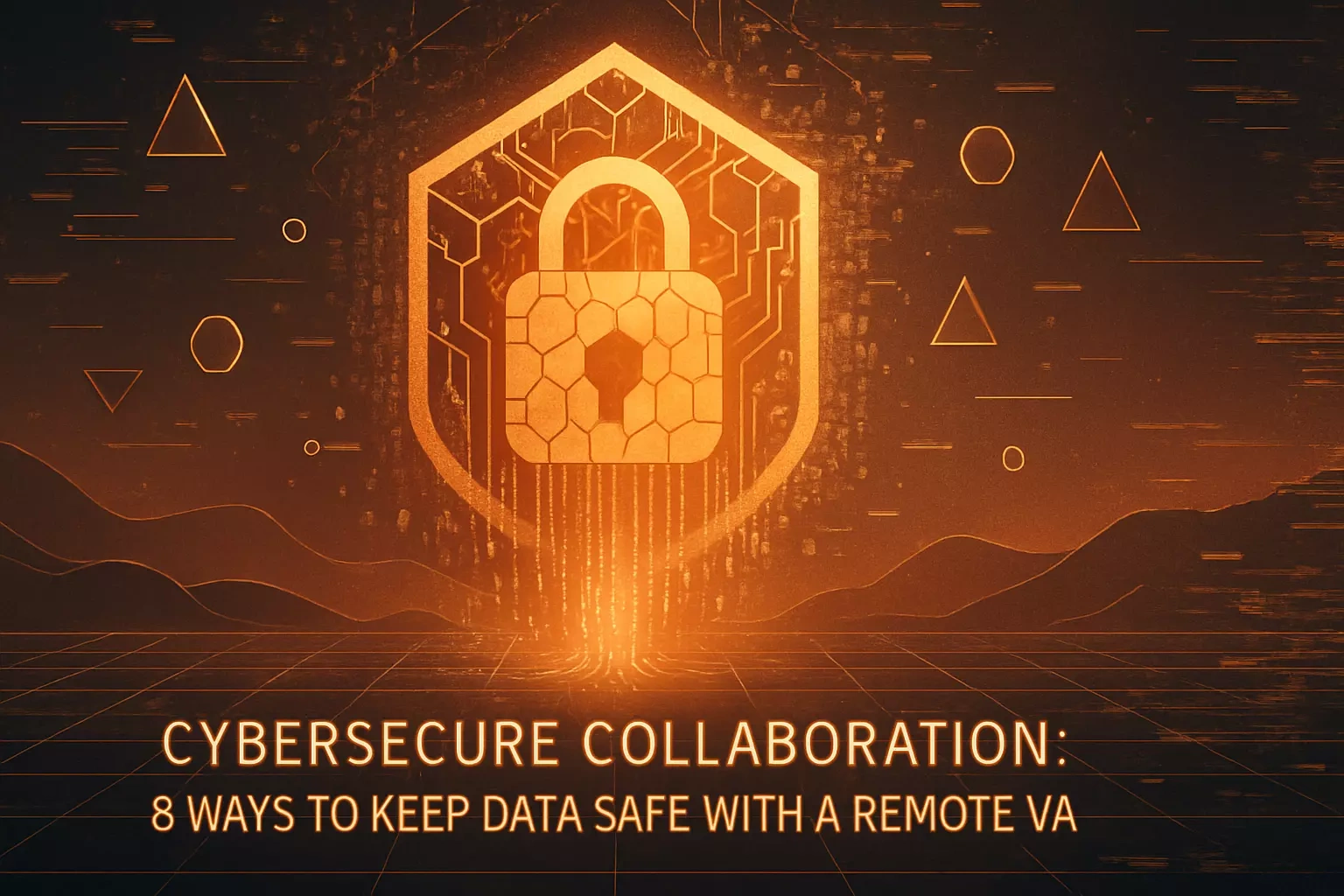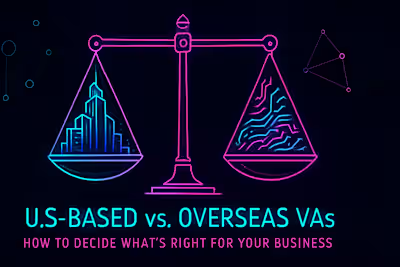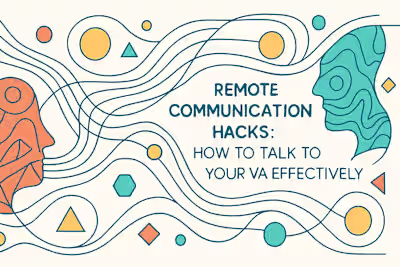Cybersecure Collaboration: 8 Ways to Keep Data Safe with a Remote VA

Cybersecure Collaboration: 8 Ways to Keep Data Safe with a Remote VA
Foundational Security Measures
Implement a Non-Disclosure Agreement (NDA)
Conduct Security Awareness Training
Secure Access and Data Handling
Use a Password Manager
Enforce the Principle of Least Privilege
Enable Multi-Factor Authentication (2FA)
Technology and Network Security
Require a Secure Wi-Fi Connection
Mandate the Use of a VPN
Ensure Software is Always Updated
References
Cybersecure Collaboration: 8 Ways to Keep Data Safe with a Remote VA
When you hire a virtual assistant, you're often granting them access to sensitive business and client information. In a remote setup, ensuring the security of this data is paramount. A data breach can damage your reputation and lead to significant financial loss. Implementing robust cybersecurity practices is not about a lack of trust; it's about professional responsibility and protecting your business. This is especially important when managing assistants across different time zones where direct oversight is limited.
Think of cybersecurity like locking your office door at night. You trust your team, but you still take precautions. The same principle applies to working with remote VAs. With the right security measures in place, you can confidently delegate tasks while keeping your data safe.
Foundational Security Measures
Before your VA even begins, lay a strong foundation for security. These initial steps establish clear expectations and legal protections from day one.
Starting with solid security basics isn't just smart—it's essential. Just like you wouldn't hand over your house keys without knowing who you're giving them to, you shouldn't grant access to business data without proper safeguards. These foundational measures create a framework that protects both you and your VA.
Implement a Non-Disclosure Agreement (NDA)
An NDA, or confidentiality agreement, is a non-negotiable first step. It legally binds your VA to protect sensitive information and outlines the consequences of a breach.
Your NDA should be clear and comprehensive. Include specifics about what constitutes confidential information—client lists, financial data, trade secrets, marketing strategies, and any proprietary processes. Don't use generic templates without customization. Make sure the agreement covers the duration of confidentiality (often extending beyond the working relationship) and the jurisdiction for any legal disputes.
Have your VA sign the NDA before sharing any sensitive information or granting system access. This isn't about mistrust—it's standard business practice that protects everyone involved. Many professional VAs expect and appreciate this level of professionalism.
Conduct Security Awareness Training
Educate your VA on your security policies and common threats like phishing scams and malware. A well-informed VA is your first line of defense against cyberattacks.
Create a simple security guide that covers your specific requirements. Include real examples of phishing emails that target businesses like yours. Show them what suspicious links look like and explain why they should never click on unexpected attachments. Walk through your password requirements and explain why strong passwords matter.
Schedule a video call to go through these policies together. This personal touch helps ensure understanding and gives your VA a chance to ask questions. Update this training quarterly as new threats emerge. Remember, even tech-savvy people can fall for sophisticated scams when they're busy or distracted.
Secure Access and Data Handling
Controlling who can access what information is a core principle of data security. Implement tools and policies that allow your VA to work efficiently without exposing sensitive data unnecessarily.
Smart access control is like giving someone a key to specific rooms rather than the master key to your entire building. Your VA needs to do their job effectively, but that doesn't mean they need access to everything. By being strategic about permissions, you reduce risk without hampering productivity.
Use a Password Manager
Never share passwords directly via email or chat. Use a password manager like LastPass or 1Password to grant access to accounts without revealing the actual credentials. This gives you full control to revoke access easily.
Password managers are game-changers for remote collaboration. Instead of sending "Password123!" through email (please don't do this), you can share access securely. Your VA logs into the password manager with their own credentials and can then access the tools they need without ever seeing the actual passwords.
Set up shared folders within your password manager for different types of accounts. Maybe one folder for social media, another for project management tools. When the working relationship ends, you can revoke access with one click. No need to change dozens of passwords or worry about what your former VA might still have access to.
Enforce the Principle of Least Privilege
Only grant your VA access to the specific data and systems they absolutely need to perform their job. This minimizes the potential damage if an account is ever compromised.
Start by mapping out exactly what your VA will be doing. If they're managing your social media, they need access to those platforms but probably not your accounting software. If they're handling customer service, they might need CRM access but not your email marketing platform's full admin rights.
Many tools allow you to create user roles with limited permissions. Use these features! For example, in Google Workspace, you can share specific folders rather than your entire Drive. In project management tools, you can restrict access to certain projects or clients. Review these permissions monthly and adjust as responsibilities change.
Enable Multi-Factor Authentication (2FA)
Add an extra layer of security to all critical accounts by requiring a second form of verification, such as a code sent to a phone. This significantly reduces the risk of unauthorized access.
Two-factor authentication might seem like a hassle, but it's incredibly effective. Even if someone gets hold of a password, they can't access the account without that second factor. Most major platforms now offer 2FA—use it everywhere possible.
Help your VA set this up properly. Use authenticator apps rather than SMS when possible, as they're more secure. For shared accounts where traditional 2FA might be tricky, look into solutions like Duo or Authy that allow for team-based authentication. Yes, it adds a few seconds to each login, but those seconds could save you from a major breach.
Technology and Network Security
The technology and networks used for work are potential vulnerabilities. Ensure that all devices and connections are properly secured.
Your VA's home office setup directly impacts your data security. While you can't control every aspect of their environment, you can set standards and provide resources to help them work safely. Think of it as extending your security perimeter to include their workspace.
Require a Secure Wi-Fi Connection
Advise your VA against using public or unsecured Wi-Fi for work. Their home network should be password-protected with strong WPA2 or WPA3 encryption.
Public Wi-Fi at coffee shops and libraries is convenient but risky. Anyone on the same network could potentially intercept data. Make it clear that work should only be done on secure, private networks. If your VA occasionally needs to work from public spaces, require them to use their phone's hotspot instead of public Wi-Fi.
Provide a simple checklist for securing their home network: change the default router password, use WPA3 encryption if available (WPA2 at minimum), and keep router firmware updated. These basic steps dramatically improve security. Consider offering a small stipend for a dedicated work internet connection if your VA handles particularly sensitive data.
Mandate the Use of a VPN
A Virtual Private Network (VPN) encrypts the internet connection, creating a secure tunnel for data transmission. This protects data from being intercepted, especially on less secure networks.
VPNs aren't just for tech companies anymore. They're affordable and easy to use. When your VA connects through a VPN, all their internet traffic is encrypted, making it nearly impossible for hackers to intercept data. This is crucial when accessing company systems or handling client information.
Choose a reputable VPN service and cover the cost for your VA. Business-grade options like NordLayer or Perimeter 81 offer better features than consumer VPNs. Show your VA how to connect before starting work each day. Make it a non-negotiable part of their routine, just like checking email.
Ensure Software is Always Updated
Outdated software is a major security risk. Ensure that your VA keeps their operating system, browser, and any other software updated to the latest versions to patch security holes.
Those update notifications that everyone loves to ignore? They're usually fixing security vulnerabilities that hackers actively exploit. Create a policy requiring updates within 48 hours of release for critical software. This includes operating systems, web browsers, and any applications used for work.
Make updates part of your regular check-ins. Ask your VA to confirm they're running the latest versions of key software. For company-provided tools, enable automatic updates where possible. Consider using device management software if you're working with multiple VAs, as this lets you monitor and enforce update policies remotely.
Remember, security isn't a one-time setup—it's an ongoing process. Regular reviews and updates to your security practices keep you ahead of evolving threats. By implementing these eight strategies, you create multiple layers of protection for your data.
Working with a remote VA doesn't have to be a security risk. With the right precautions in place, you can enjoy all the benefits of virtual assistance while keeping your sensitive information safe. Start with these fundamentals, and adjust based on your specific needs and risk tolerance. Your future self (and your clients) will thank you for taking security seriously from day one.
References
Like this project
Posted Jun 30, 2025
Working with a virtual assistant requires robust data security. Learn how to protect sensitive information with NDAs, secure tools, and access control policies.








